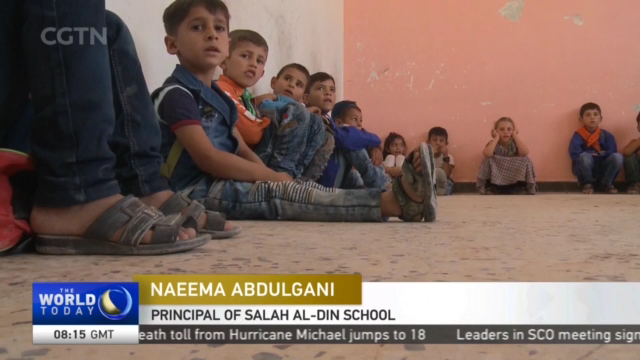
17:12, 13-Oct-2018
Syria Reconstruction: Projects bring changes to once ISIL-held town Dayr Hafir
Updated
16:24, 16-Oct-2018
03:50

The fighting in Syria may not be over yet, but reconstruction is underway and life is slowly getting back to normal. In remote towns and villages, people are picking up the pieces with the help of a UN refugee agency. Xu Dezhi tells us what the big plans are for these small towns.
Some 50 kilometers east of Aleppo is Dayr Hafir, a town once held by ISIL. On the main road, signs of ruin are still everywhere. But things have improved since government forces took control back in January 2017.
More and more locals are returning, and the UNHCR and its partners started a host of projects, laying down a more robust foundation for reconstruction.
New street lamp poles are being erected. And they're no ordinary ones. These are solar powered lamps from the UNHCR. And come November, 400 more will light up Dayr Hafir and the surrounding areas once more.
Not far from the main road lies one of the most important features of UNHCR on the town: a satellite community center. It holds workshops and entertainment events for both children and adults. More importantly, it also offers a 3-month rapid learning course for children who had to put school on hold due to the conflict, so they can catch up with the curriculum.
In this Homework Cafe, children are trying to finish their assignments with the help of volunteers and staff. Najah Alshawi used to be a teacher, now works here every day, assisting them with their studies.
NAJAH ALSHAWI SATELLITE COMMUNITY CENTER "This place is about assisting children who have a hard time doing homework. They have the patience but they need someone who can help them and stand by their side so they can really learn."
Education remains key in reconstruction. At the end of 2017, UNHCR renovated Salah al-Din School, which once served as a prison for ISIL. Naeema Abdulgani thought she was ready to retire, but after hearing the biggest school in Dayr Hafir was about to re-open, she happily postponed her retirement.
NAEEMA ABDULGANI PRINCIPAL OF SALAH AL-DIN SCHOOL "The war has damaged a whole generation intellectually. We have an illiterate generation so we need a large number of schools to open. So the children can compensate for the time they have missed."
Still, there's a lack of equipment. Many classrooms have only 2 or 3 tables. Most of the 600 students have to sit on the floor.
Kids are memorizing Arabic letters in wrong pronunciation. The principal is very frank. With such a long crisis, she believes the only thing schools can do, is to ensure at least after grown up, these kids can read and find jobs to do.
NAEEMA ABDULGANI PRINCIPAL OF SALAH AL-DIN SCHOOL "The children need to put in a lot of effort so they can make up for the last seven years. I can't expect too much from them, but I hope we can help make up for a little portion of what they have missed."
Staff of the center say they hope there will come a day when the center closes. Because that would mean living conditions would be good enough such that the community would not require the UNHCR's help. Xu Dezhi, CGTN. Dayr Hafir, Syria.

SITEMAP
Copyright © 2018 CGTN. Beijing ICP prepared NO.16065310-3
Copyright © 2018 CGTN. Beijing ICP prepared NO.16065310-3